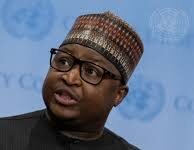By Amin Kef (Ranger)
In an exclusive interview, Ambassador Michael Imran Kanu of Sierra Leone elaborated on the country’s agenda as it takes on the presidency of the United Nations Security Council this August. Ambassador Kanu plans to use this influential platform to advocate for Africa, pushing for a permanent Council seat for the continent and more elected seats through a significant debate scheduled for August 12, 2024.
Sierra Leone, currently serving a two-year term on the Security Council, is dedicating its rotating presidency to addressing the need for Council reform, specifically focusing on Africa’s representation. This mark the first time the Council will concentrate entirely on this issue. Ambassador Michael Imran Kanu emphasized that the reformed Council must rectify the historical injustice faced by Africa. The African Union has long called for at least two permanent seats and two additional elective seats for African countries in an expanded Council.
“What we’ll focus on in this debate in the Security Council is really just making the case for Africa,” he stated. “Because of the historical injustice, Africa should be treated as a special case and should be prioritized.”
The reform debate has lingered within the UN for nearly half of its 79-year existence. Ambassador Michael Imran Kanu believes the current Council discussion offers a unique opportunity for its members, particularly the five permanent ones (P5), to support what is known as the Common African Position. This momentum is crucial as the UN approaches its 80th anniversary next year.
Highlighting a historical precedent, the Ambassador pointed to the People’s Republic of China’s admission as a permanent member in 1971, replacing Taiwan, through General Assembly Resolution 2758. He argues that Africa deserves similar recognition.
The reform topic is expected to gain more attention with the arrival of Heads of State and Government in mid-September for the adoption of the Pact for the Future. This declaration will reinforce the Summit of the Future, a key focus of the General Assembly’s opening session. Although definitive outcomes might not emerge in September, Ambassador Michael Imran Kanu believes that “sufficient momentum” could be achieved by next year.
UN Secretary-General, António Guterres, has noted that all five permanent members support at least one permanent seat for Africa. The Council’s last major reform in 1962 aimed to address imbalances by adding seats for various regions, yet the power disparity remains unresolved.
Jane Boulden, an expert in international relations and security studies, argues that the reform conversation should not only focus on representation but also on the Council’s efficiency in maintaining global peace and security. “Security Council reform is enormously difficult. It’s highly contentious,” she stated.
Sierra Leone’s agenda on Council reform will be further discussed in an open debate on building peace on August 21. As the leader of the Committee of 10 (C10) under the African Union, Sierra Leone will argue that more African representation will enhance peace and security in the continent.
The US has expressed support for expanding the Council to include more nonpermanent and permanent seats for Africa and Latin America, without granting veto power to new members. Despite President Joe Biden’s backing, changes have yet to materialize.
Sierra Leone’s presidency will also address other critical issues, including an open debate on sustaining the women, peace and security agenda amid the draw downs of peacekeeping missions on August 7. Additionally, the Council will hold regular meetings on UN peacekeeping missions and political situations in various regions, including Lebanon, South Sudan, Libya, Syria and Ukraine.
Reflecting on Sierra Leone’s journey, Ambassador Michael Imran Kanu noted, “We’ve been active throughout, but we had our own difficulties in the 90s. We had civil conflicts. Before that, we had a one-party dictatorship that lasted for over 30 years. We were able to resolve our dispute, and after some two decades, we’ve consolidated democratic governance and we’re back in the Security Council with a unique experience.”
Ambassador Michael Imran Kanu, 49, holds a Doctorate of Juridical Science in international business law and multiple degrees in law. He serves as Sierra Leone’s permanent representative to the UN and holds various diplomatic positions. He is married to Rita Sia Abibatu Kanu, and they have two children.




